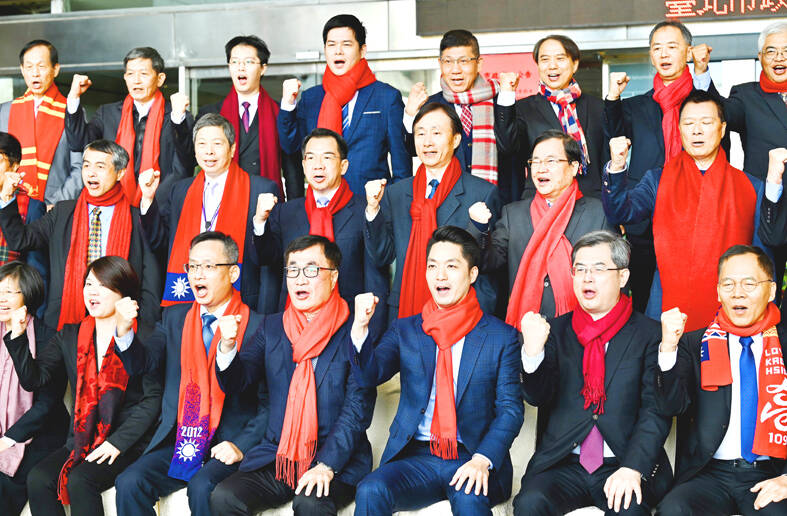Chiang Wan-an (蔣萬安) of the Chinese Nationalist Party (KMT) took office as Taipei mayor yesterday, pledging to deal with the long-drawn out Taipei Dome problem, traffic congestion in Neihu District (內湖) and urban renewal issues as soon as possible.
At an inauguration ceremony at Taipei City Hall in the morning, Ko Wen-je (柯文哲) stepped down after eight years as mayor and handed the mayor’s seal over to Chiang, the youngest Taipei mayor ever elected.
It was Taipei’s eighth inauguration ceremony to swear in a mayor.

Photo: Lo Pei-de, Taipei Times
Ko said he advised Chiang’s administrative team that when facing tough choices, they should imagine themselves looking back to the present from 50 years in the future and the answer would be clear.
Ko said he hopes Chiang and his administrative team would uphold honesty and integrity in governance.
Most importantly, they should not sacrifice long-term interests for short-term ones, nor sacrifice the majority’s interests for those of a few people, or sacrifice national interests for party interests, he said.
The Taipei City Council in June passed self-governance regulations to achieve net zero emissions by 2050, which would be an important task for Chiang, he said.
In his inaugural address, Chiang said he has taken on the important task of guiding Taipei forward.
He understands that amid competition from international cities and facing an ever-changing global situation, a city that does not move forward would fall behind, so he would always strive to be better, Chiang said.
His team would pursue “four windows of opportunity”: making Taipei a prosperous city; making it a city where talented people would be willing to stay and could pursue creative endeavors; renewing Taipei to make it a modern city with more environmentally friendly buildings; and promoting Taipei’s local features and urban tourism to make it a charming city with cultural heritage, he said.
Chiang said he would meet with city departments to understand their needs and collect their opinions, and enable administrative operations to run smoothly.
He would speed up the handling of the Taipei Dome project, the Neihu traffic problem and urban renewal issues, he said.
Chiang reiterated his promise to finish the Taipei Dome construction project within a year of taking office, as well as resolve traffic congestion that has long been a serious concern for Neihu residents.
He has also pledged new urban renewal policies to Taipei residents, so he must get to work as soon as possible, Chiang said.
Newly elected and re-elected mayor and county commissioners nationwide were also sworn in yesterday.

Several Chinese Nationalist Party (KMT) officials including Chairman Eric Chu (朱立倫) are to be summoned for questioning and then transferred to prosecutors for holding an illegal assembly in Taipei last night, the Taipei Police said today. Chu and two others hosted an illegal assembly and are to be requested to explain their actions, the Taipei City Police Department's Zhongzheng (中正) First Precinct said, referring to a protest held after Huang Lu Chin-ju (黃呂錦茹), KMT Taipei's chapter director, and several other KMT staffers were questioned for alleged signature forgery in recall petitions against Democratic Progressive Party (DPP) legislators. Taipei prosecutors had filed

Taiwan would welcome the return of Honduras as a diplomatic ally if its next president decides to make such a move, Minister of Foreign Affairs Lin Chia-lung (林佳龍) said yesterday. “Of course, we would welcome Honduras if they want to restore diplomatic ties with Taiwan after their elections,” Lin said at a meeting of the legislature’s Foreign Affairs and National Defense Committee, when asked to comment on statements made by two of the three Honduran presidential candidates during the presidential campaign in the Central American country. Taiwan is paying close attention to the region as a whole in the wake of a

President William Lai (賴清德) has appointed former vice president Chen Chien-jen (陳建仁) to attend the late Pope Francis’ funeral at the Vatican City on Saturday on his behalf, the Ministry of Foreign Affairs said today. The Holy See announced Francis’ funeral would take place on Saturday at 10am in St Peter’s Square. The ministry expressed condolences over Francis’ passing and said that Chen would represent Taiwan at the funeral and offer condolences in person. Taiwan and the Vatican have a long-standing and close diplomatic relationship, the ministry said. Both sides agreed to have Chen represent Taiwan at the funeral, given his Catholic identity and

Lawmakers from the Democratic Progressive Party (DPP) yesterday established a friendship group with their counterparts in Ukraine to promote parliamentary exchanges between the two countries. A ceremony in Taipei for the Taiwan-Ukraine Parliamentary Friendship Association, initiated by DPP Legislator Chen Kuan-ting (陳冠廷), was attended by lawmakers and officials, including Deputy Minister of Foreign Affairs Francois Wu (吳志中) and European Economic and Trade Office in Taiwan Director Lutz Gullner. The increasingly dire situation in Ukraine is a global concern, and Taiwan cannot turn its back when the latter is in need of help, as the two countries share many common values and interests,